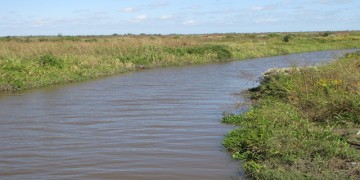The Double Bayou Watershed Partnership Announces Release of Draft Plan for Public Comment

Anahuac, Texas, January 27, 2016 (Newswire.com) - The Double Bayou Watershed Partnership is seeking public comment on the Draft Double Bayou Watershed Protection Plan (Draft WPP). The Draft WPP is available online at www.doublebayou.org/wpp-document. Hard copies can be made available upon request if desired; contact Stephanie Glenn (contact information below) to request a print copy.
Since May 2013, stakeholders in the Double Bayou Watershed have met to discuss specific topics and how they affect the watershed. The watershed protection planning process is a voluntary, stakeholder-driven process designed to generate information, ideas, and solutions from within the watershed. The Draft WPP will serve as a plan to guide voluntary implementation efforts to improve water quality. "The hard work of the local stakeholders has produced the draft Double Bayou Watershed Protection Plan” said Stephanie Glenn, Program Director of Hydrology and Watersheds at HARC. "Everyone is excited to take this next step forward and invite public comments on the Plan".
"The hard work of the local stakeholders has produced the draft Double Bayou Watershed Protection Plan and everyone is excited to take this next step forward and invite public comments"
Stephanie Glenn, Program Director of Hydrology and Watersheds, HARC
We welcome any and all comments. Your input is extremely important. If you have questions, members of the Partnership will be available for a public question and answer session at the Anahuac Branch of the Chambers County Library, Thursday, February 11th, 2016, from 11:00 a.m. to 3:00 p.m. Address: 202 Cummings Street, Anahuac, Texas.
Visit the Double Bayou Watershed Partnership website at www.doublebayou.org for more information and to find meeting notes from previous meetings, as well as other documents that give more background on the project.
_________________________________________________________________________________
Public comments are due: Friday, February 26th, 2016. Comments may be made to the entire document or to just portions of it. Comments may be submitted by any of the following methods:
Email: sglenn@harcresearch.org
U.S. mail: Stephanie Glenn, Houston Advanced Research Center, 4800 Research Forest Drive, The Woodlands, TX 77381
If you have any questions, please contact:
Linda Shead, 713-703-1123 or email linda.shead@sheadconservation.com
Stephanie Glenn, 281-364-6042 or email sglenn@harcresearch.org
_________________________________________________________________________________
Funding provided through a Clean Water Act §319(h) Nonpoint Source Grant from the Texas State Soil and Water Conservation Board and the U.S. Environmental Protection Agency.
TSSWCB administers Texas’ soil and water conservation law and delivers coordinated natural resource conservation programs through the State’s 216 soil and water conservation districts. TSSWCB is the lead agency for planning, implementing, and managing programs for preventing and abating agricultural and silvicultural nonpoint sources of water pollution. The agency also administers a water supply enhancement program for the targeted control of water-depleting brush; works to ensure the State’s network of 2,000 flood control dams are protecting lives and property; and facilitates the Texas Invasive Species Coordinating Committee. Visit TSSWCB at www.tsswcb.texas.gov.
GBEP is providing some of the funding towards the Double Bayou Watershed Protection Plan. The Galveston Bay Estuary Program, a non-regulatory program administered by the Texas Commission on Environmental Quality, is one of 28 National Estuary Programs in the U.S. under the Environmental Protection Agency, and is charged with coordinating and facilitating partnerships to implement The Galveston Bay Plan. Find out more about GBEP at www.gbep.state.tx.us.
HARC is a research hub providing independent analysis on energy, air, and water issues to people seeking scientific answers. HARC is focused on building a sustainable future that helps people thrive and nature flourish. Visit HARC at www.HARCresearch.org.
